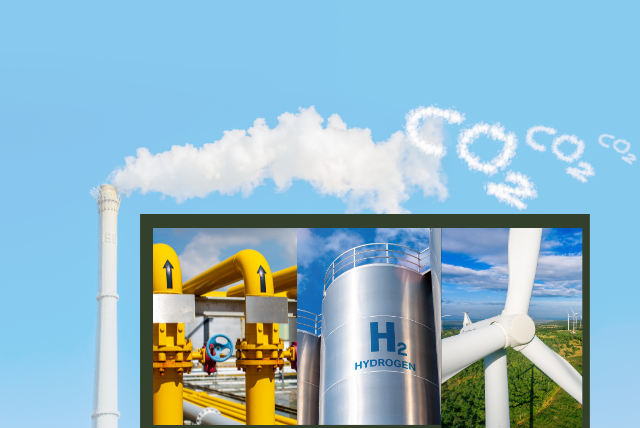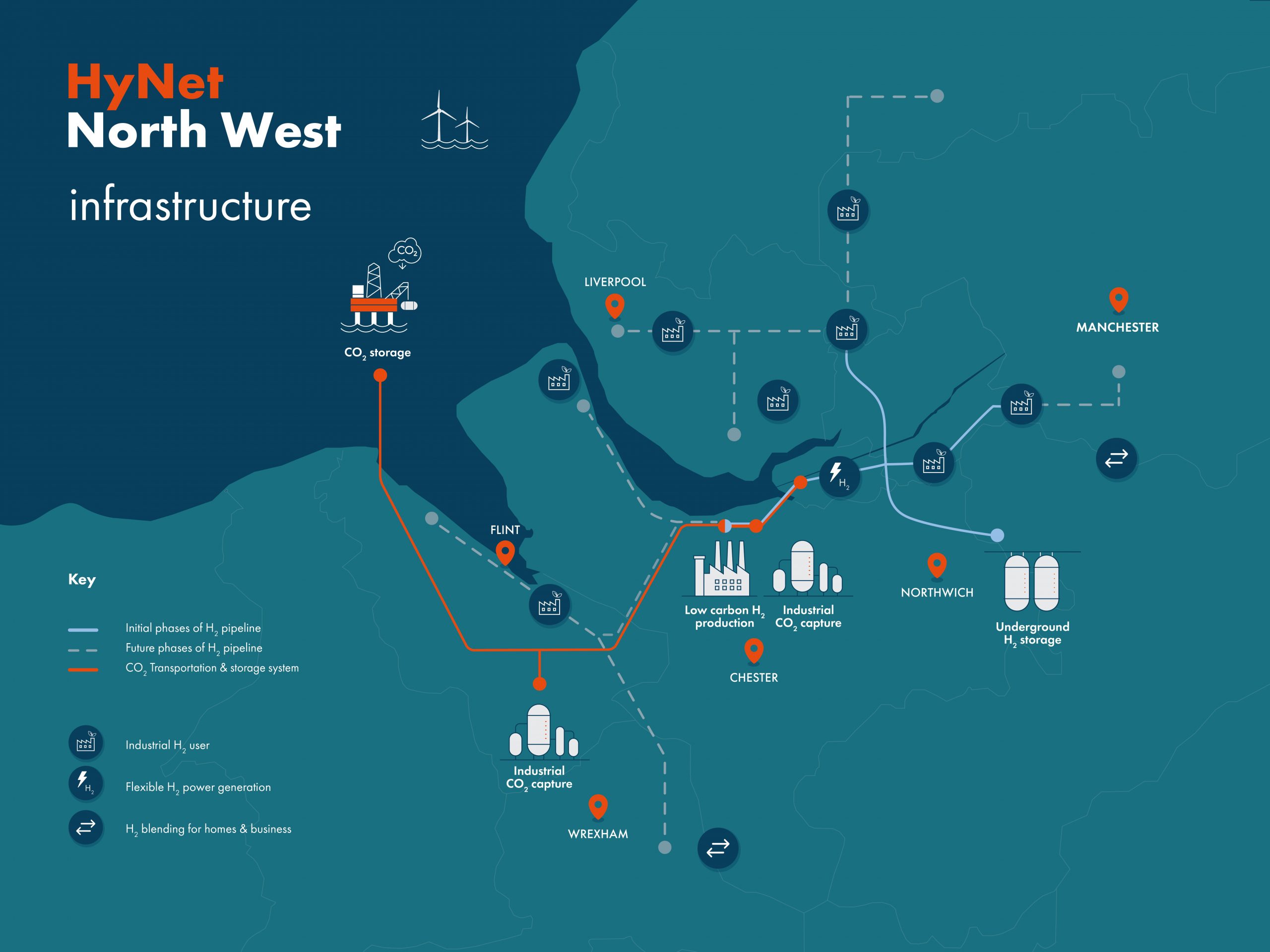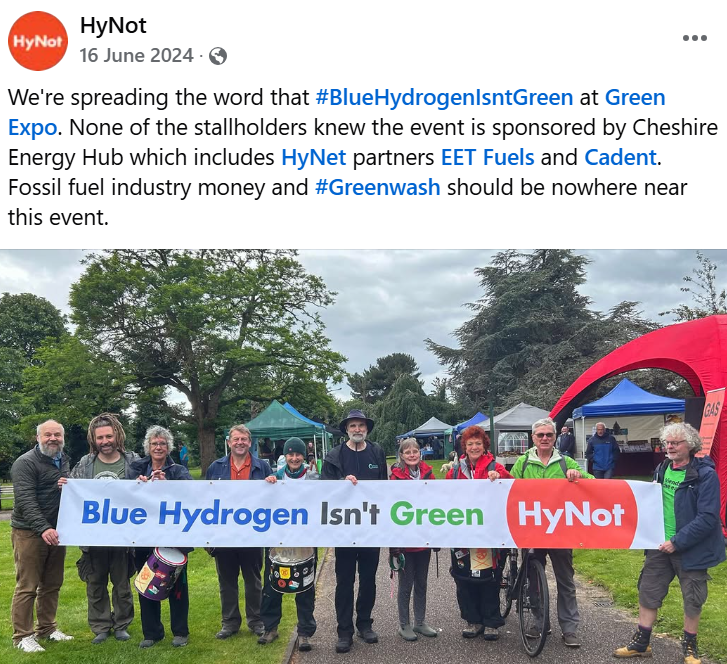
Helen Tandy, Founding Director, Eco Communities
At the International Summit on the Future of Energy Security, held at Lancaster House on April 24, 2025, Labour leader Sir Keir Starmer announced a major development that could have profound implications for Cheshire and the wider North West. The government has awarded a £2 billion supply chain contract to energy firm ENI* for the HyNet Carbon Capture and Storage (CCS) project. HyNet is much more than just Carbon Capture and Storage (CCS)
We last circulated information on Hynet in 2022 when Martin Preston, Secretary of Chester Sustainability Forum wrote about the Hynet Public Debate for our Tellus Magazine (see here)
For supporters, this is a landmark moment: HyNet promises to capture carbon emissions, produce low-carbon hydrogen, and create 2,000 jobs across North Wales and North West England. But for others, including the local campaign group HyNot, it’s a worrying sign of public money being directed toward solutions they see as flawed and fossil fuel-dependent.
So what exactly is HyNet—and why does it divide opinion so sharply?
What HyNet North West Aims to Achieve

1. Capturing and Storing CO₂
HyNet plans to collect carbon dioxide emissions from the region’s heavy industries—like chemicals, cement, and oil refining—and permanently store them in depleted gas fields under Liverpool Bay.
2. Producing Low-Carbon Hydrogen
By 2025, HyNet aims to deliver up to 1 GW of “blue” hydrogen, increasing to 5 GW by 2030. This hydrogen, made from natural gas but with carbon emissions captured and stored, could help decarbonise factories, power stations, and even home heating.
3. Supporting Jobs and Economic Growth
The project forecasts the creation of around 2,000 local jobs and a £17 billion boost to the region’s economy over 25 years, thanks to supply chain investments and infrastructure development.
The Case For HyNet
Supporters argue HyNet offers genuine environmental and economic benefits:
-
Tackling Hard-to-Abate Emissions:
Industries like cement and chemicals have few other options to reach net zero. CCS offers a critical pathway for them to cut emissions. -
Building Energy Security:
Locally-produced hydrogen could replace volatile fossil gas imports, potentially stabilising energy prices in the long run. -
Strengthening the Renewable Grid:
Hydrogen can act as a storage medium, helping to balance the ups and downs of wind and solar generation.
In short, proponents see HyNet as a critical bridge to a cleaner future—a way to decarbonise the toughest sectors while boosting local economies.
The Criticisms: Why HyNot Campaigners Say “No”
Despite HyNet’s promises, not everyone is convinced. The local HyNot campaign group and others have flagged several concerns, including the effectiveness of carbon capture, the reliance on fossil fuels for blue hydrogen, and the question of whether public money could be better spent elsewhere.
However, it’s important to address a specific local misunderstanding. At last year’s Chester Green Weekend, some HyNot campaigners accused the event of being financed by HyNet and implied it was a form of greenwashing. This claim was simply not true. Chester Green Weekend was independently organised, without any funding from HyNet.
As someone closely involved in the event and in wider sustainability work across the region, I can say with certainty that our focus has always been on positive engagement, education, and community-building—not on corporate promotion. The Sustainable Cheshire Fairs and now Chester Green Weekend were created to celebrate and promote local environmental action.
While I fully support free speech and open debate, it’s disheartening when misinformation clouds the important work we do. Many campaigners know me personally and the commitment I bring to building a greener, fairer future for our community in my own time. I truly hope that this year’s Chester Green Weekend will be a space for positive conversations, collaboration, and inspiring action, without the negativity that marred last year’s event.

1. Greenwashing Risks
Critics highlight that CCS has a mixed track record: projects like Canada’s Boundary Dam have captured far less CO₂ than promised. Meanwhile, “blue” hydrogen still depends on fossil gas extraction, and methane leaks in the supply chain could undermine the climate benefits.
2. A Question of Priorities
With tens of billions in public subsidies going to CCS and blue hydrogen, campaigners argue that proven solutions like wind, solar, and energy efficiency should be getting more investment instead delivering bigger, faster carbon cuts.
3. Community Concerns
The HyNot group, formed in 2022, has staged local protests arguing that HyNet props up corporate profits and fossil fuel interests rather than investing in truly community-led clean energy initiatives. They demand more transparency, tighter regulation, and a greater focus on renewables.
What is Chester West & Chester Council’s View?
Cheshire West and Chester Council supports HyNet as part of its response to the regions climate emergency. The region has a lot of heavy industry and see it as a practical way to cut emissions from these which would otherwise be very difficult to decarbonise. Such as oil refineries, chemical plants, and manufacturing facilities, these produce a lot of CO₂. The Council views HyNet’s carbon capture and hydrogen production as essential to helping these businesses lower emissions without shutting down or relocating. The Council of course needs to hit net-zero and protect jobs. HyNet promises thousands of new green jobs and major investment in the region. Supporting it aligns with the Council’s economic regeneration plans, especially for industrial areas like Ellesmere Port.
While ideally everything would run purely on renewables, the Council recognises that complete electrification or renewable-only solutions for heavy industry aren’t ready at scale yet. HyNet is seen as a “bridge” technology that can slash emissions now, while more renewable capacity is built up over time. The Council declared a Climate Emergency in 2019 and set ambitious local carbon reduction targets. HyNet gives them a faster route to hit those targets, especially by decarbonising heat and industry, while improving local energy resilience.
Verdict: Opportunity or Risk?
We’ll let you decide.
We’ve tried hard to share both sides of the story, but at times, it feels like we’re stuck playing piggy in the middle. Recently, HyNet supporters criticised us for allowing the HyNot campaign group to have a stall at Chester Green Weekend, they came uninvited. Last year HyNot campaigners accused the event of being backed by the fossil fuel industry—again, completely untrue.
We simply wish both sides would get the local facts right. We believe strongly in open debate, but also in respectful, fact-based discussion. The real challenge now is: how do we turn this heated debate into something positive and productive for our region?
There’s no doubt that HyNet could play an important role in the green transition, especially for industries that are difficult to decarbonise. Capturing CO₂ and building hydrogen infrastructure are significant steps towards net zero.
At the same time, the concerns raised by HyNot and others are valid. Over-reliance on carbon capture—which remains unproven at large scale—and ongoing dependence on fossil fuels could delay the move to truly clean energy. Public funds must be invested wisely, with strict oversight, transparency, and a strong parallel focus on renewables and energy efficiency.
In the end, HyNet could be a vital part of our future—but only if it is part of a broader, balanced strategy that puts communities, transparency, and proven climate solutions at its core.
*ENI has been awarded the contract. ENI is a major Italian multinational energy company, headquartered in Rome. It’s one of the world’s largest oil and gas companies, but in recent years it has been trying to reposition itself as a player in the energy transition — moving into areas like carbon capture, hydrogen, and renewables.
Here’s a quick overview of ENI:
-
Founded: 1953
-
Sector: Traditionally oil and gas (exploration, production, refining), now expanding into low-carbon technologies.
-
Global Reach: Operates in more than 60 countries, with major projects in Europe, Africa, and the Middle East.
-
Energy Transition Plans:
-
ENI has pledged to be carbon neutral by 2050.
-
It’s investing in CCS (carbon capture and storage), renewable energy, and “blue” and “green” hydrogen projects.
-
They have developed expertise in reusing depleted oil and gas fields — like the ones under Liverpool Bay — for CO₂ storage, which made them a strong technical fit for HyNet’s carbon capture needs.
-
In the HyNet project, ENI owns and operates the infrastructure under Liverpool Bay, where the captured CO₂ will be stored in old gas fields. Their role is key because safe, permanent storage is one of the most technically challenging parts of a carbon capture scheme.




